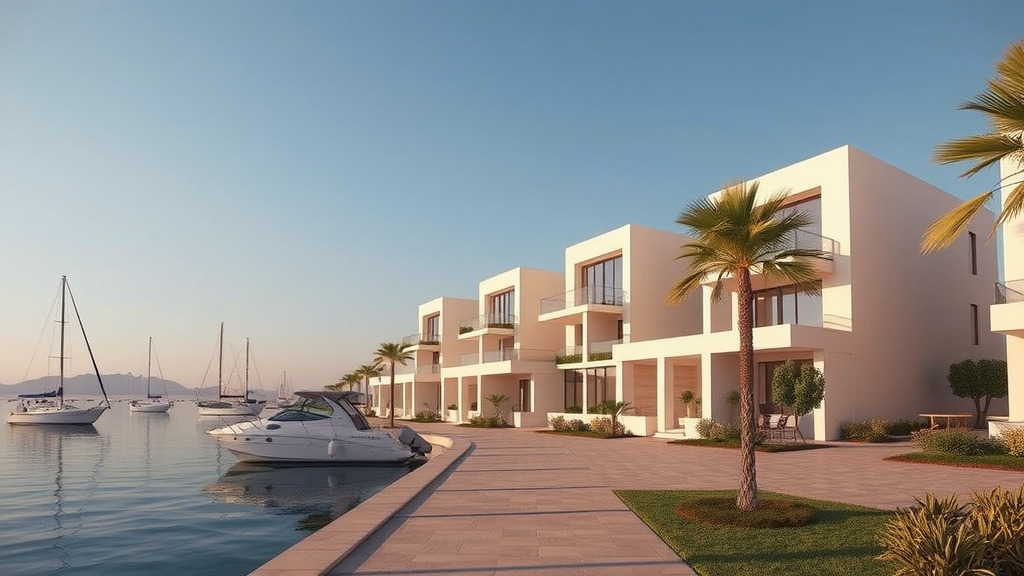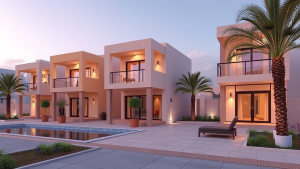The impact of vision 2030 projects on maintaining stable living costs in Hurghada
Hurghada, a popular tourist destination along the Red Sea, is experiencing transformative changes as part of Egypt’s Vision 2030 initiative. This multi-faceted strategy aims to enhance the quality of life for residents and tourists alike. One significant aspect of these changes is their impact on maintaining stable living costs in Hurghada.
The Vision 2030 projects introduce various infrastructural improvements and economic diversifications that play a crucial role in stabilizing the cost of living in Hurghada. Below are some key ways these projects contribute:
- Infrastructure Development: Upgrading road systems, public transport, and utilities ensures that living costs are kept in check. Efficient transportation reduces commute times and costs for both residents and businesses, fostering an economically friendly environment.
- Tourism Growth: With enhancements in tourism infrastructure, including hotels and attractions, there is a rise in visitors. More tourists lead to increased local business opportunities, which can help lower prices as competition increases.
- Sustainable Energy Initiatives: Vision 2030 emphasizes renewable energy sources, such as solar energy. By investing in these technologies, the dependency on imported fuels decreases, which may help lower monthly utility bills for residents.
In addition to these main factors, the emphasis on creating job opportunities throughout Hurghada is noteworthy. With new sectors emerging, residents can find employment more easily, allowing them to support their families and manage their expenses effectively. A stable job market leads to increased purchasing power, which is essential for maintaining decent living standards.
Another critical element in stabilizing living costs is the focus on the agricultural sector. Vision 2030 promotes local food production, reducing dependency on imported goods. By supporting local farmers and encouraging sustainable practices, the price volatility often associated with food imports can be minimized.
For example, agricultural projects that utilize innovative techniques like vertical farming and hybrid crops not only contribute to food security but can also lower the cost of groceries. When food is produced closer to home, transportation costs decrease, resulting in more affordable prices for consumers.
The vision also places emphasis on healthcare and education improvements, which are essential for a high quality of life. Accessible and affordable healthcare can significantly reduce the financial burden on families. Similarly, better educational infrastructure means that citizens can acquire valuable skills, leading to higher earning potential and job stability. Access to quality services contributes to the overall economic well-being of residents, helping to maintain stable living costs.
Investments in technology and digital transformation are also a focus of Vision 2030. With a growing emphasis on smart cities, residents in Hurghada can expect better digital services and efficiencies that reduce costs. Smart technologies facilitate the management of resources, enabling effective monitoring of utilities and infrastructure, ultimately benefiting the consumer.
- Improving Waste Management: A robust waste management system helps to keep the environment clean, which in turn can enhance property values and neighborhood desirability.
- Incentivizing Local Businesses: New policies favoring local entrepreneurs encourage them to keep their prices competitive while promoting job creation.
The collaboration between the government and private sector is vital for successfully implementing these projects. These partnerships lead to innovative solutions that address urban challenges while keeping affordability in mind.
As Vision 2030 continues to unfold in Hurghada, it fosters an environment that not only prioritizes economic growth but also emphasizes the importance of keeping living costs stable. Each initiative under this vision speaks to the interconnectedness of community development and individual well-being.
Ultimately, residents of Hurghada can look forward to a brighter future where living costs remain manageable. Through strategic planning and execution of Vision 2030 projects, the city is set on a path toward sustained economic stability, enhancing the overall quality of life for both its locals and visitors.
How sustainable development initiatives support economic growth in Hurghada
Sustainable development initiatives play a critical role in shaping the economic landscape of Hurghada, a vibrant city on the Red Sea coast of Egypt. By focusing on long-term ecological balance, these initiatives not only enhance the quality of life but also foster a robust economy that benefits local residents and businesses alike. You may wonder how such initiatives can create a positive ripple effect. Let’s explore the various dimensions through which sustainable development supports economic growth in Hurghada.
Promoting eco-tourism
One of the most significant ways sustainable development initiatives boost economic growth is by promoting eco-tourism. Hurghada has positioned itself as a prime destination for eco-conscious travelers who are eager to explore its pristine beaches and rich marine biodiversity. The city encourages sustainable practices among local tour operators, which enables them to offer green experiences like:
- Guided tours to natural reserves
- Snorkeling and diving excursions with eco-friendly operators
- Workshops focused on local wildlife and conservation efforts
By attracting eco-tourists, new job opportunities emerge for local residents, which reinforces economic stability. This approach also helps protect natural resources, ensuring that they remain a draw for future visitors.
Fostering renewable energy solutions
A long-term economic strategy tied to sustainable development involves investing in renewable energy solutions. Hurghada has been actively adopting solar and wind energy sources. This shift not only minimizes dependence on fossil fuels but also slashes energy costs for households and businesses. The benefits include:
- Lower utility bills for residents
- Attracting businesses focused on sustainability
- Job creation in the renewable energy sector
By harnessing natural resources, Hurghada sets a precedent for other cities, showcasing that economic growth can occur hand-in-hand with environmental stewardship.
Encouraging green building practices
Sustainable development initiatives also advocate for green building practices in construction and urban planning. This trend leads to the creation of structures that are not only environmentally friendly but also cost-efficient. Key aspects of green buildings include:
- Utilization of eco-friendly materials
- Incorporation of energy-efficient designs
- Water conservation systems
Such advancements enhance the living experience for residents and serve as an attractive selling point for potential homebuyers and investors. Consequently, upward pressure on real estate values can contribute to increased wealth in the community.
Enhancing local agriculture
Another important facet of sustainable development is the emphasis on local agriculture. By adopting sustainable farming practices, local farmers in Hurghada can produce organic and high-quality crops. This not only improves food security but also positively impacts the economy in various ways, such as:
- Reducing the need for imported goods
- Supporting local markets
- Creating job opportunities in agriculture and food distribution
As a result, residents receive fresher, healthier food choices while simultaneously supporting the local economy.
Encouraging community engagement
Sustainable development initiatives often thrive on community involvement. When local citizens engage in their city’s sustainable practices, it fosters a spirit of unity and responsibility. Initiatives promoting community gardens, recycling programs, or public clean-up days encourage residents to care for their environment. When communities are actively involved, the local economy benefits through:
- Increased local participation in entrepreneurship
- Strengthened social ties, leading to business collaborations
- A boost in community-driven events and tourism
This active participation creates an ecosystem where every member contributes to the sustainable growth of Hurghada.
Sustainable development initiatives in Hurghada have profound implications on economic growth. From promoting eco-tourism and renewable energy to encouraging green building practices and local agriculture, these efforts are paving the way for a prosperous and stable economy. As residents and businesses continue to engage in these sustainable practices, the benefits are evident—proving that taking care of the environment goes hand in hand with creating a thriving economic future.
The Vision 2030 projects play a crucial role in shaping the economic landscape of Hurghada, ensuring that the cost of living remains manageable for its residents. By focusing on sustainable development initiatives, local authorities are creating long-term strategies that foster economic growth while keeping inflation at bay. These projects not only enhance infrastructure but also promote tourism and attract investments, leading to job creation and increased disposable income for locals.
As sustainable development becomes a cornerstone of the city’s progress, benefits ripple across various sectors, including housing, transportation, and utilities. This interconnected approach means that affordability in Hurghada is not just a fleeting goal but a sustainable reality.
Moreover, the collaboration between government entities and private organizations strengthens this framework, ensuring that the pulse of economic growth is matched by the stability of living costs. By leveraging local resources and environmentally friendly practices, Hurghada is setting a benchmark for other cities aiming for similar sustainable goals.
Residents can look forward to a vibrant future where the impacts of these Vision 2030 initiatives translate to practical benefits in their day-to-day lives. As the city evolves, the emphasis on maintaining stable living costs through economic resilience stands as a promise of better quality living. This holistic approach ensures Hurghada not only thrives today but maintains its appeal for future generations, aligning economic growth with an enduring commitment to affordability and sustainability.










